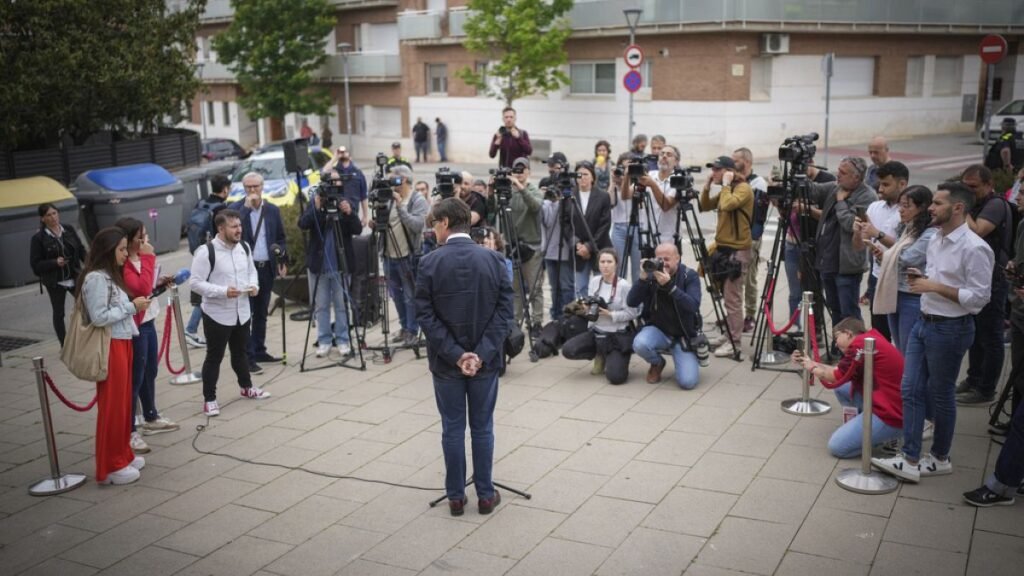Catalonia is facing a crucial regional election that will impact the future of Spain as a whole. With over 5.7 million eligible voters, the outcome of the election will test the strength of the separatist movement in the wealthy northeastern region and also gauge the popularity of Prime Minister Pedro Sánchez. The separatists have been in power in the regional parliament for more than a decade, but recent polling and past national elections have shown a decrease in support for secession since former regional president Carlos Puigdemont’s unsuccessful attempt in 2017. Puigdemont, who has been in self-imposed exile in southern France, is hoping to return to Spain if newly elected lawmakers choose him as the regional president following the election. However, he is currently under investigation for alleged terrorism offenses related to violent protests in 2019. He is seeking amnesty from Spain’s parliament, potentially through Sánchez’s efforts to reduce tensions in Catalonia by pardoning high-profile separatists.
The election is crucial for Sánchez, who could face a major setback if voters do not support his Socialist party. He has been campaigning alongside Salvador Illa, the regional Catalan candidate for the Socialists, who won the most votes in a 2021 regional election but was unable to prevent separatist Pere Aragonès from forming a government. Within the separatist movement itself, there are divisions between Puigdemont’s conservative Together party and Aragonès’s Republican Left of Catalonia. Additionally, a new pro-secession, far-right party called Catalan Alliance, which focuses on issues such as unauthorized immigration and separatism, is hoping to gain parliamentary representation. As a total of nine parties are running in the election, a coalition government is inevitable since no single party is expected to win enough seats to reach the absolute majority of 68 in the chamber.
The outcome of the regional election in Catalonia will have significant implications for the future of Spanish politics. It will test the strength of the separatist movement and determine the level of support for Prime Minister Pedro Sánchez and his Socialist party. The separatists, who have been in power in the regional parliament for over a decade, are facing challenges due to declining support for secession since the failed attempt in 2017 led by former regional president Carlos Puigdemont. Puigdemont, who is currently in self-imposed exile in southern France, hopes to return to Spain if elected as the regional president. However, he is under investigation for alleged terrorism offenses, and he is seeking amnesty through Sánchez’s efforts to reduce tensions in Catalonia.
The election is a crucial moment for Sánchez, who could face a blow if voters do not support his party. He has been campaigning with the regional Catalan candidate for the Socialists, Salvador Illa, who won the most votes in the 2021 regional election but was unable to prevent a separatist government from forming. Within the separatist movement, there are divisions between Puigdemont’s conservative party and Aragonès’s Republican Left of Catalonia. Additionally, a new far-right party called Catalan Alliance, which advocates for separatism and focuses on issues such as unauthorized immigration, is hoping to gain parliamentary representation. With nine parties running in the election, a coalition government is likely to be formed since no single party is expected to win enough seats to secure an absolute majority in the chamber.
Overall, the regional election in Catalonia is set to have far-reaching consequences for Spanish politics. It will serve as a test of the separatist movement’s strength and also as a gauge of support for Prime Minister Pedro Sánchez and his Socialist party. The current divisions within the separatist movement, with multiple parties vying for power, highlight the complexity of the political landscape in Catalonia. As voters head to the polls, the outcome of the election will shape the future direction of the region and could have implications for the broader national political scene in Spain.

